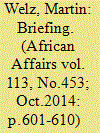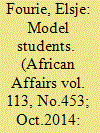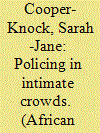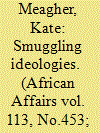|
|
|
Sort Order |
|
|
|
Items / Page
|
|
|
|
|
|
|
| Srl | Item |
| 1 |
ID:
134351


|
|
|
|
|
| Summary/Abstract |
ACADEMIC ANALYSES OF THE PROLONGED CRISIS in the Central African Republic (CAR) and the international response to it are rare. This masks the depth of the crisis. The most recent outbreak of conflict alone, following a coup d'état staged by the Séléka rebels in March 2013, left countless civilians dead,1 more than half a million people displaced, and over half of the 4.6 million population in immediate need of aid.2 Several regional and international organizations, including the African Union (AU), the Economic Community of Central African States (ECCAS), the European Union (EU), and the United Nations (UN), became involved in the process of crisis solution, with all of the organizations deploying troops to the CAR. Their efforts have thus far born limited results; fighting and human suffering continue.
|
|
|
|
|
|
|
|
|
|
|
|
|
|
|
|
| 2 |
ID:
134348


|
|
|
|
|
| Summary/Abstract |
Contemporary scholarship on policy making in Africa tends either to view the process as being entirely divorced from international policy lessons and experiences, or to portray policy makers as prone to unreflective imitation of whichever countries happen to be economically and politically ascendant. Kenya's Vision 2030 demonstrates both of these assumptions to be flawed: not only have Kenyan planners and technocrats consciously emulated foreign models in the formulation and execution of this long-term development plan, but the way in which they have done this is embedded in a historical reading of Kenya's development trajectory as well as the trajectories of those countries from which lessons are drawn. Thus, Vision 2030 bears the imprint of Singaporean and Malaysian policies, rather than only the more modish “Chinese Model”. Far from heralding the birth of an entirely new East Asia-inspired development paradigm, this emulation echoes the early years of post-colonial Kenya, when technologically optimistic planners such as Tom Mboya sought to guide the country along the path of modernization, deploying tools such as technocratic rule, rapid economic growth, and social engineering. The Kenyan case therefore demonstrates processes of policy emulation in Africa to be both more prevalent and more nuanced than is commonly assumed.
|
|
|
|
|
|
|
|
|
|
|
|
|
|
|
|
| 3 |
ID:
134347


|
|
|
|
|
| Summary/Abstract |
Since the mid-2000s militant local political protests have been a frequent occurrence in informal settlements and townships across South Africa. Allegations of corruption and favouritism figure prominently in these demonstrations that often aim to remove local officials who are perceived not to have delivered on their electoral promises. Focusing on the relationship between patronage politics and local protests, this article analyses the 2011 unrest in Zandspruit informal settlement on the outskirts of Johannesburg. The protests were triggered by intra-African National Congress (ANC) rivalry and factionalism in the build-up to the local elections. Through an analysis of the political opportunities, framing processes, and mobilizing structures of the protests, the article depicts the ways in which patronage and collective action work together. By doing so, it reveals the agency “from below” of local elite and subaltern groups in defining the formation and mutual advancement of patron–client relations. The article thus shows how the close relationship between the ANC and the state at the local level gives rise to particular patron–client relations between low-income residents, the ANC, and the state. As a result, the state is not understood as a bureaucratic dispenser of public goods on the basis of rights but as a relational system of reciprocal dependence and obligation.
|
|
|
|
|
|
|
|
|
|
|
|
|
|
|
|
| 4 |
ID:
134349


|
|
|
|
|
| Summary/Abstract |
A growing scholarship on policing and security has produced valuable insights into the workings of private security firms, state police, and citizen-led policing organizations across Africa. In contrast, few have explored “mob justice” – the policing performed by less organized, more transient formations of citizens. In academic and popular accounts, mobs are depicted as anonymous, sovereign entities, acting in a space that the state will not, or cannot, enter. Focusing on the township of KwaMashu in Durban, South Africa, this article challenges this homogeneous depiction. Although anonymous mobs punctuate the township's history, residents often find themselves within “intimate crowds”, navigating the ties that frequently bind them to their suspects, and negotiating a space in which they can act without fear of repercussion, legal or otherwise. The state police often play an important role in shaping the parameters of this policing, even when no case is formally opened. This reappraisal of policing formations consolidates and extends our understanding of statehood, society, and sovereignty in post-apartheid South Africa.
|
|
|
|
|
|
|
|
|
|
|
|
|
|
|
|
| 5 |
ID:
134346


|
|
|
|
|
| Summary/Abstract |
This article explores shifting perspectives on African clandestine economies. Previously condemned as products of clientelism and corruption, clandestine economies are attracting renewed interest for their developmental potential in weak state contexts. Focusing on systems of illicit cross-border trade in East and West Africa, this article shows that more favourable views of clandestine trading activities are driven more by their compatibility with liberal reform agendas than by their positive contribution to local development. Indeed, the optimistic turn in perspectives on illicit African trade glosses over its increasingly negative impact on local security and development. While discourses of violence and criminalization were used to characterize the largely peaceful cross-border trading systems in West Africa in the 1990s, new discourses of hybrid governance and state building are used to frame the more violent and socially disruptive cross-border trading complexes of East Africa in the 2000s.
|
|
|
|
|
|
|
|
|
|
|
|
|
|
|
|
| 6 |
ID:
134350


|
|
|
|
|
| Summary/Abstract |
Nearly every week there are stories of destructive fires in Kenyan secondary schools. Most of these are suspected arson cases, and the usual suspects are the schools' current students. This article provides the first analysis of the recent spate of school-based fire incidents, based on a comprehensive survey of media, government, and court reports, as well as primary data collected through interviews with students, educators, and administrators. This evidence clearly demonstrates that school-based arson is a phenomenon that spans regions in Kenya, and occurs in boys', girls', and mixed schools, private and public schools, and across school calendars. Current and former students explain this trend in terms of arson's effectiveness as a tactic in protest politics. Based on these findings, I argue that school-based arson is indicative of more than the contested conditions of education in Kenya today. The use of arson by students reflects what this generation has learned about how protest and politics work in Kenya. Students' recognition that destructive collective actions are efficacious in winning a response from authorities highlights that learning and feeds a reactionary mode of governance in which citizens' initiatives tend to be neglected until they pose direct threats to public peace and financing.
|
|
|
|
|
|
|
|
|
|
|
|
|
|
|
|
|
|
|
|
|